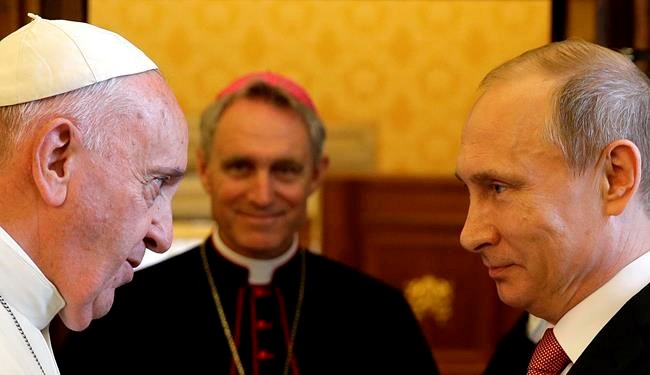ROME (AP) — Pope Francis went to the Russian Embassy on Friday to personally “express his concern about the war” in Ukraine, in an extraordinary, hands-on papal gesture that has no recent precedent. Francis later assured a top Ukrainian Greek Catholic leader he would do "everything I can” to help.
Usually, popes receive ambassadors and heads of state in the Vatican, and diplomatic protocol would have called for the Vatican foreign minister to summon the Russian ambassador. Francis is the Vatican head of state, and for him to leave the walled city state and travel a short distance to the Russian Embassy to the Holy See was a sign of his anger at Moscow’s invasion and his willingness to appeal personally for an end to it.
Vatican officials said they knew of no such previous papal initiative.
Vatican spokesman Matteo Bruni confirmed the visit, and the Vatican said Francis traveled to and from the embassy in a small white car.
“The Holy See press office confirms that the pope went to the Russian Embassy to the Holy See on Via della Conciliazione, clearly to express his concern about the war. He was there for just over a half-hour,” Bruni said.
Francis has called for dialogue to end the conflict and has urged the faithful to set next Wednesday as a day of fasting and prayer for peace in Ukraine. But he has refrained from publicly calling out Russia by name, presumably for fear of antagonizing the Russian Orthodox Church.
Just this week, at the end of his Wednesday general audience, he refrained from naming Russia when he urged political leaders to examine their conscience before God and avoid actions that harm civilians and “discredit international law.”
A day later, the Vatican secretary of state, Cardinal Pietro Parolin, held out hope for diplomacy. “There is still time for good will, there is still room for negotiation, there is still room for the exercise of a wisdom that prevents the prevalence of partisan interests, protects the legitimate aspirations of each and saves the world from the madness and horrors of war,” Parolin said in a statement.
A person who answered the phone Friday at the Russian Embassy said Ambassador Alexander Avdeev wasn’t there; there was no immediate reply to an email sent to the embassy seeking comment.
The head of the Ukrainian Greek Catholic Church, the largest Eastern Rite church in communion with Rome, welcomed Francis' protocol-bending diplomatic intervention and said he hoped it would help dialogue prevail over force.
His Beatitude Sviatoslav Shevchuk said the pope later phoned him in Kyiv and assured him “I will do everything I can.”
Shevchuk, who has hunkered down in a bunker under his cathedral along with Ukrainian civilians seeking shelter, said Francis inquired during the call about the plight of clerics in the hardest-hit areas of Ukraine.
The pope thanked the Greek Catholic Church leader for opening the doors of the cathedral and staying with his flock, Shevchuk's office said in a statement.
Francis assured Shevchuk of his support and prayers for Ukraine and its “suffering people,” the statement said.
News of Francis' initiative came just after the Vatican announced he had canceled a scheduled Sunday visit to Florence and will not preside over Ash Wednesday commemorations next week because of a flareup of “acute” knee pain. The Vatican said the 85-year-old pope's doctors had prescribed a period of rest.
The pope, who has long had sciatica nerve pain that makes him walk with a pronounced limp, has suffered for several weeks with what he has said is an inflamed ligament in his right knee. He has cited the pain in explaining his limited mobility recently and his decision to remain seated during events that would otherwise have him stand.
Francis had been due to travel to Florence for a half-day visit Sunday to address a meeting of Mediterranean bishops and mayors and to celebrate Mass. It would have been his first pastoral visit within Italy since the pandemic.
He was to have presided over Ash Wednesday commemorations, including a short procession, at a church outside the Vatican in the Aventine neighborhood of Rome.
The Argentine Jesuit enjoys generally good health, though he had 33 centimeters (13 inches) of his large intestine removed in July. Francis also had part of one lung removed when he was a young man after a respiratory infection.
Despite the knee pain, the Vatican on Friday released Francis’ itinerary for an April 2-3 visit to Malta, making clear he plans to go ahead with his agenda.
Nicole Winfield, The Associated Press


